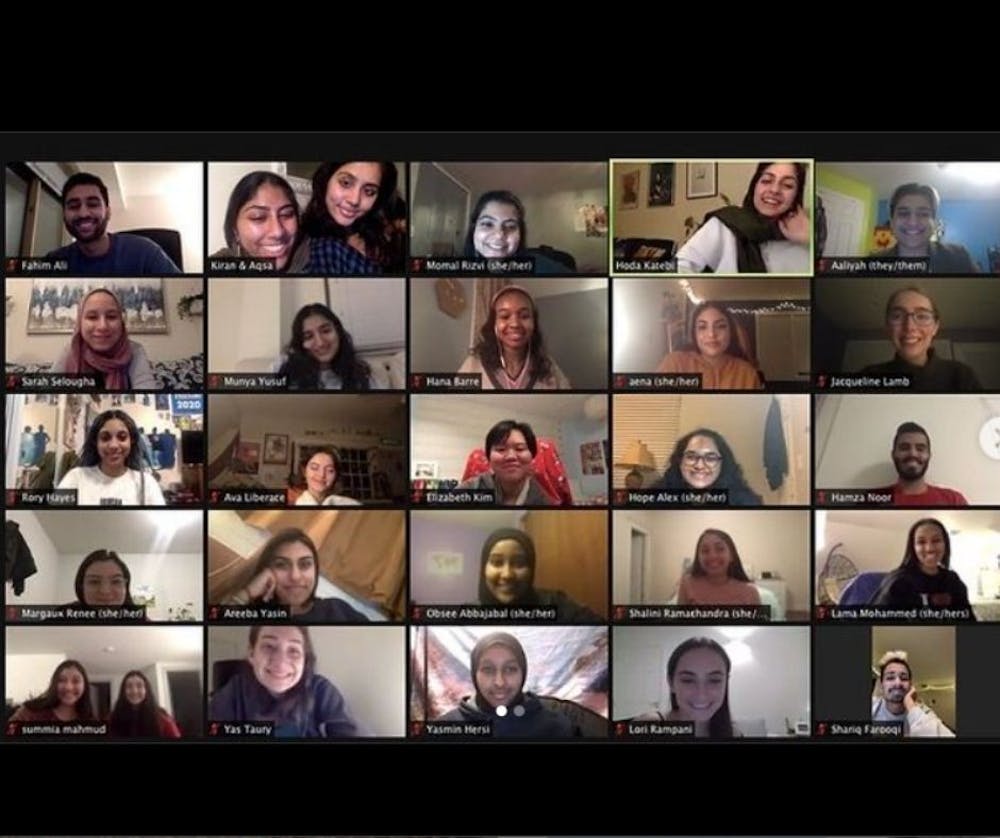Picture courtesy of AU Muslim Student Association (MSA).
Iranian American activist, Hoda Katebi, spoke to AU students via Zoom on Wednesday, Feb. 17 in an event about the politics of fast fashion hosted by the AU Muslim Student Association (MSA) and Women’s Initiative.
Katebi, who refers to herself as the “angry daughter of Iranian immigrants,” first became internationally-recognized through her political fashion blog Joojoo Azad. Since the launch of her blog, her work has been featured in Vogue, BBC news and New York Times and she is the author of the book Tehran Streetstyle.
She also hosts #BecauseWe’veRead, a digital and global book club that provides access to radical work by authors like James Baldwin and Edward Said with live discussions. Katebi is the founder of the Blue Tin Production, an all-women’s immigrant and refugee run apparel cooperative. Much of Katebi’s work focuses on the abolition of the fast fashion industry, which disproportionately impacts Black and brown women around the world.
“Gender-based exploitation and violence is not just something that we can take out or reform, but it is a required part of fast fashion production. So in an industry like this, we can’t reform it, we have to get rid of it altogether,” Katebi said.
Gender-based violence and workers’ rights violations have been widespread issues in the garment industry, sparking thousands of workers to protest at factories across the globe. Bangladesh — the second largest exporter of clothes in the world — is one of the many countries where over 40 million workers are exploited, according to a video report by BBC News. These problems in the industry have only been exacerbated by COVID-19, where millions of garment workers have been unemployed or left unpaid due to the financial crisis in the fashion industry.
As a self-identified abolitionist, Katebi has been outspoken throughout her career about U.S. militarization, imperialism, and surveillance, arguing that these issues are directly related to violence in the fashion industry.
She has condemned programs like Countering Violence Extremism (CVE), a program started by the Department of Homeland Security that targets Muslim communities by identifying radicalization through behavior and appearance. The ACLU, the Muslim Justice League, and other social justice groups have also called out CVE citing that the program violates civil rights and disportionately profiles Muslims across the country.
During the event, Katebi told the audience that CVE was inspired by failed gang prevention programs, which profiled the appearances of Black men in Black neighborhoods in order to add them to gang databases. In a study by the Justice Policy Institute, researchers found that gang membership werevidentified on loose terms such as certain clothing used as a racial profiling tool by law enforcement in cities.
“Fashion is actually intimately tied to state surveillance, and just state repression is very palatable for a lot of communities, so everyone’s decisions when they leave the house are political,” Katebi said.
AU senior and creative director of Women’s Initiative, Aaliyah Charania, felt that this event was set apart from others because of Katebi’s role as an abolitionist. “My biggest takeaway as an audience member was how surveillance is connected to everything, and how abolition starts at home; at both the micro and macro level,” Charania said.
Katebi who is also Chicago-based discussed how her own abolitionist work has been based around collectivity, especially Palestinian and Black solidarity in Chicago, a city with a strong tradition of abolition.
“I didn't realize what radical love meant until I entered Black organizing in Chicago and I was like oh my god this is the most beautiful way that community organizing can happen,” Katebi said. “I owe everything to the struggles that I got to spend so much time working alongside.”
Katebi wrapped up the discussion by addressing AU student activists and organizers on how to best practice allyship in the campus community. “You [students] have the same goals and you also all don't want to be connected to these horrible things done in your name.” said Katebi. “ How powerful would it be to have a larger coalition of students being able to fight for divestment, being able to fight for cops off campus; all these things that are actually related.”



